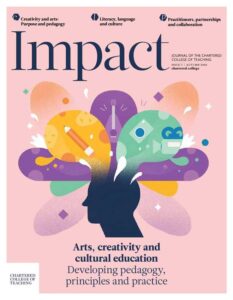Schools love to measure things. They like to collect these measurements up and present the numbers as an ineffable truth about a pupil’s progress. The data is exact and can predict what a child might get in a GCSE in a particular subject at some time in the future. And this works reasonably well for subjects in which measurements can be precise. The whole point of the arts, however, is they exist entirely in a world where things aren’t precise. To put it another way, the arts are the subjects that are unapologetically subjective. This is why the arts are awkward – they exist at the point a person looks upon the world, finds it wanting and through an art form or two, seek to make a difference in that world in some small way:
“Here is my art.”
In schools, therefore, the arts aren’t merely part of a transfer of knowledge from teacher to pupil. Nor are they mainly about the use of reason to capture and express a point of view or an argument drawing upon facts from the world.
Join us or sign in now to view the rest of this page
You're viewing this site as a guest, which only allows you to view a limited amount of content.
To view this page and get access to all our resources, join the Chartered College of Teaching (it's free for trainee teachers and half price for ECTs) or log in if you're already a member.











